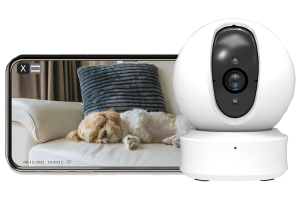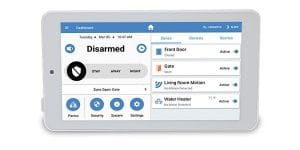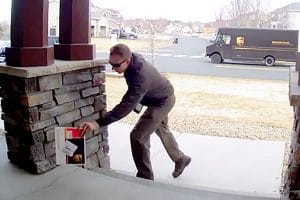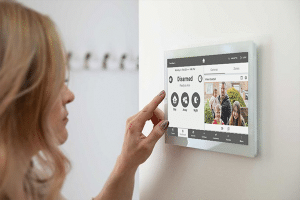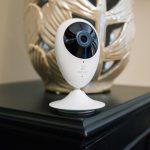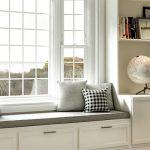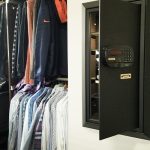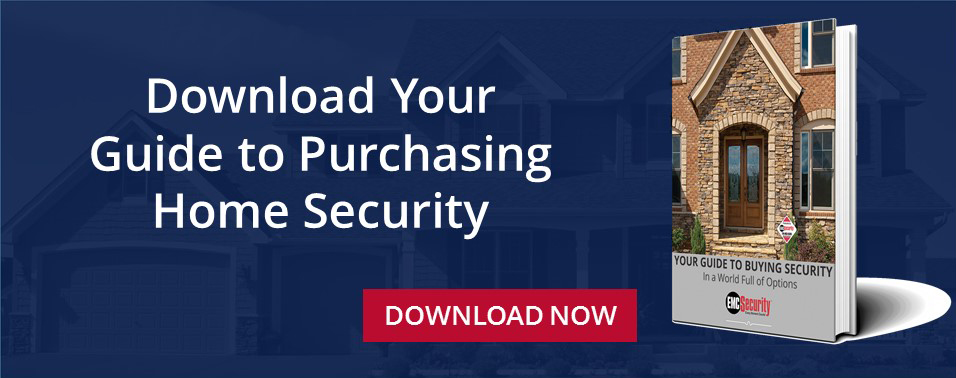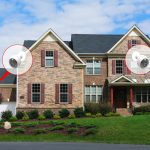Your cart is currently empty!
Category: Security-Cameras
-

Security System vs Security Cameras
Whether you’re thinking about investing in a home security system and are considering an alarm system or a security camera, or you already have one but want to know more about the other option, you need to consider the pros and cons of each type of equipment.
By taking into account these factors, you’ll be able to make an informed decision about which type of security device will work best for your needs.
Security cameras have a variety of benefits
Security cameras are an increasingly popular way to monitor your home and keep tabs on your family, pets, and valuables. They’re particularly useful if you’re away from home for extended periods of time as it allows for remote viewing of the camera’s feed. You can also set up motion detection features that will allow the camera to send alerts when it detects movement in its line of sight. This can be especially useful if you want to know if there is someone lurking around outside your house at night without having to be physically present there.
You can also use security cameras to monitor inside your home while you’re away by setting them up with a live feed over WiFi or Internet connection so that other people have access as well (for example: friends and family members who want updates). This may sound like an invasion of privacy but remember that many homeowners already have webcams installed throughout their house anyway! The difference here is those webcams don’t provide any kind of security or safety benefits—they’re just there because they look cool 🙂
on the other hand…
Security alarm systems can be more secure than cameras.
If you’re looking for a more sophisticated security solution, a security alarm system might be the best bet. Security alarms have more sensors than cameras and are thus more difficult to bypass without being detected. Additionally, most home security companies employ professionals who can monitor your home’s alarm system and respond quickly if an intruder triggers it. This means that even if you’re not at home when someone breaks in, it’s unlikely that he or she will have time to do much damage before being caught by the police or private security guards from your HOA or neighborhood watch group.

If money isn’t an issue for you and you prefer a hands-off approach to monitoring your property—for example, if most of the time no one is at home when burglars break in—homeowners may want to consider installing both cameras and motion lights around their homes instead of just one or the other. If there’s no movement detected after 15 minutes (or however long is appropriate based on how often people move around inside), then simply turning off all exterior lighting could deter future attacks as well as alerting anyone passing by that something’s wrong.”
however…
Security cameras can serve different purposes.
When it comes to security cameras, you have a lot of options. Security cameras can be used for many different purposes and in many different locations in your home or business. Some people use security cameras to monitor their homes while they’re away on vacation or out of the office. Other people use them to keep an eye on their kids while they’re at school, or even to watch over their pets while they’re at work or in other parts of the house.
Security systems are also useful for monitoring businesses during business hours, especially if you have employees working there who need constant supervision and attention paid to what’s happening inside your building (and outside).
but…
Alarm systems can be more discreet than security cameras.
If a home security system is an investment, then the cameras are just one piece of it. If you’re setting up your own network of cameras and sensors, you can tuck them away in a corner out of sight. Alarm systems have to be visible in order to function properly.
Alarm systems also cost more than their camera counterparts: they require professional installation and sometimes even monthly fees depending on whether or not they’re wireless or hardwired. Security cameras tend to be cheaper because they can be self-installed with little difficulty; however, even if you hire someone else for the job, alarm systems typically cost more than any other type of home automation device.
There’s something about having an alarm system—even if it’s just for aesthetic purposes—that makes people feel safer in their homes (and there’s plenty of research that supports this).
DIY security systems with wireless components will save you money in installation costs. Wireless security systems are easier to install than wired systems. The first thing that you need to understand is that wireless components can be installed in hard-to-reach places, like over your garage or on the roof of your home. This type of installation doesn’t require a professional technician and will save you money because it does not require additional labor costs or materials like drilling holes into walls and running wires. Wireless components can also be installed without disturbing the existing wiring in your home; this means that there won’t be any mess left behind after installation is complete!
It’s possible to use your smart home security system’s app to control both your lights and thermostat, giving you even more options for savings.
You can use your smart home security system’s app to control both your lights and thermostat, giving you even more options for savings. It’s possible to set the thermostat so it will turn on at a certain time every day, ensuring that things are warm or cool when you get home. You can also program it to keep the house comfortable for when guests come over and want to stay for dinner. And if you have pets, this means they won’t accidentally be left in hot or cold spots of the house!
People need to consider the pros and cons of alarm systems vs security cameras and make an informed decision about their home security needs. When it comes to home security, there are a lot of options. You can have a security system or you can use security cameras.
If you’re not sure which one is right for your needs, keep reading!
An alarm system will alert authorities when someone breaks into your house or business in an attempt to steal from it.
Security cameras provide visual proof that someone was inside your home at a given time—and they might even catch them in action! They are great for catching burglars who break into houses because they don’t want anyone else around while they do their thing. However, they aren’t effective against other kinds of crimes such as vandalism or robbery due to lack of interaction between perpetrator and victim during these acts (like breaking windows).
When deciding what kind of security system is best for your home, you need to take into account the pros and cons of each option.
To discuss your options with an EMC Security specialist, call 770-963-0305 or schedule a call here >>
-

Boost Home Safety with Cameras
Cameras are a great way to make your home safer, but it can get overwhelming. To help you find the right cameras for your needs, here’s a rundown of the features you should look for:
There are so many security camera options, the features can fill a book. To narrow your search, start with the categories below.
Cameras are an important aspect of home safety. They can be used both as security devices and as surveillance tools, depending on your needs. If you’re looking for indoor cameras, there are many different options to choose from: wireless or wired, color or black-and-white. There are also outdoor camera options that will help keep your home safe from intruders—or at least give you some peace of mind about what’s happening outside when you’re not around.
Many people use cameras to monitor their homes while they’re away so they know who has been coming into their house during the day while they work or go out at night after everyone has gone to bed. Other people use them primarily as a way of making sure their loved ones are safe; if a camera detects something amiss (like smoke), emergency services can be notified so someone can check up on things immediately instead of waiting for someone else like a neighbor or family member who might not be available right away due to other commitments like work schedules.
How Many Cameras Do You Need?
How many cameras you need depends on the size of your home. If you live in a large house and want to cover all areas of the property, it’s possible that one camera might not be enough. You may need to install more than one per room.
If you have a small home or are looking for something less expensive, however, then one camera could easily suffice for most rooms.
What Kind of Cameras and Where?
There are a few different types of cameras you can use. Wireless cameras can be installed anywhere without running cables because they connect directly to your Wi-Fi network via an antenna that picks up RF signals from wireless routers and transmitters in homes around them. You’ll simply need one more component—a power supply—for each wireless camera since it doesn’t run on electricity like wired versions do.
A wired security camera is connected to a DVR or video recorder. It transmits video and audio over wires, which means you need to run cables from the camera to your security system’s receiver.
The best type of system depends on where you want your cameras placed and how many rooms will be monitored at once because two types offer different features:
Wireless systems provide remote access so users can view live footage from their smartphones, computers, tablets and other devices when they’re away from home; however these models usually cost more than wired ones since they come with built-in webcams (aka IP Cameras).
Wired systems don’t require extra equipment but are limited by distance limitations between the camera itself (where there isn’t anything blocking its signal) and its receiver(s). This means there may not be enough range between all locations being monitored if several rooms have multiple entrances/exits around them like kitchens do — unless additional receivers are added into play!
Security Camera Features to Consider
When choosing the right security camera for you, be sure to consider a few things:
Video resolution. The higher the video resolution, the better your footage will be when it comes time to review your cameras’ recordings. However, keep in mind that higher resolutions also mean larger file sizes—and that can result in more storage needed on your hard drive or cloud server if you opt for cloud storage.
Night vision. This feature allows a camera’s lens to have an increased sensitivity to light during nighttime hours, making it easier for them to detect motion even in low-light conditions (such as when someone passes by). If you’re worried about burglars or other intruders coming into your home at night and doing damage while no one’s around, this is definitely something worth taking advantage of!
Motion detection. Another great feature for security cameras is motion detection; these devices will automatically start recording whenever they sense movement nearby so that you’ll always have footage of what happened right before something bad occurred (and can use this information later if necessary). Motion detection is especially useful when used alongside other features like two-way audio capabilities because now any suspicious activity happening outside will also get recorded as well! This ensures protection wherever possible – even if someone tries something sneaky while pretending not notice them watching out their window.”
Things to Know Before You Buy
Before you buy a camera, keep these things in mind:
Make sure it’s compatible with your smartphone. This will allow you to see what the camera sees and monitor your home from anywhere.
Look for a camera with a battery backup. If power goes out during an emergency or break-in, the battery backup will keep them running long enough for authorities to arrive.
Check how many pixels per inch (PPI) the lens has when comparing cameras—the higher the resolution, the better quality images you’ll get from your device of choice! If you want to see in pitch blackness like no one else can, opt for infrared technology on our home monitoring systems—it’s basically night vision goggles but way less bulky and expensive. A wide field of view means more coverage area; plus it makes installation much easier since there aren’t any blind spots where criminals could hide out undetected until it’s too late!
The exact cameras you need depend on your situation, such as whether you live in a city apartment or rural farmhouse.
The exact cameras you need depend on your situation, such as whether you live in a city apartment or rural farmhouse. If you live in an apartment building, it might be smart to install a camera outside your door. While this doesn’t prevent burglaries, it helps police identify suspects who are caught on camera breaking into apartments with their faces clearly visible.
If you live on a farm with livestock and crops, perhaps installing a few security cameras around the perimeter of your property is best for monitoring any activity that may occur at night after everyone else has gone to bed.
Conclusion
With so many choices, it can be hard to decide which security cameras are right for your home. But now that you know the basics, you’re on your way to making an informed decision that will keep your family safe and secure. You should also keep in mind that there are many other factors that go into choosing the right system, such as how much money you want to spend or how much time it will take before everything is installed in place. Whatever type of camera system you decide upon, make sure it has all of the features listed above so that when emergencies arise we can all sleep better at night knowing our loved ones are protected!
-

Safety Tips When Selling Your Home
Placing your home on the market shouldn’t result in increased risks to home security.
In fact, it’s in situations like this when you should amp up your protection even more. Why? Because when a real estate agent invites potential buyers into your home, their primary concern is selling your home, not with your valuables.
There have been many reports of homeowners being burglarized shortly after allowing prospective buyers inside. In these burglaries, small but expensive items such as jewelry and watches have been stolen.
If you are placing a house on the market now or in the future, EMC Security can help you protect your home in more ways than one. For instance, did you know that you can set your alarm keypad to grant access to certain people during specific times of the day? Want to monitor the activity inside your home from across town or while you’re at work? We’ve got you covered! Here are a few security tips to help you have a safer home selling experience:
1. Give Guest Code Authorization to Realtors
If you have an alarm system, avoid giving out your main security code (and if you don’t have a burglar alarm, get one!). Many modern systems allow you to program guest codes, some of which even make those codes usable only during certain times and on certain days. Requiring guests to use codes allow you to limit access to your home and can keep a log of when specific codes were used to enter your home. Assigning unique passwords to realtors also helps create an added sense of responsibility on the part of the realtor. Need help with this feature? Contact EMC Security at 770.963.0305 to check compatibility from one of our security experts.
2. Obligate Realtors to Re-arm Your System Before Leaving
In addition to ensuring certain that all doors are properly secured and locked, make it a requirement that realtors reactivate your system prior to leaving your home. It’s also a good idea to document your request with the broker by giving them written instructions pertaining to your request. Taking such strong precautions could mean the difference between your home being protected as opposed to being burglarized.
3. Use Indoor Home Surveillance Cameras
Whether hidden or placed in plain sight, surveillance cameras are a deterrent to theft and can be invaluable to protecting your property. In the worst-case scenario, they can provide evidence to police in the event of a crime. Some security cameras will even allow you to remotely monitor your home while away.
4. Check Your Windows
Even if you’ve instructed your realtor to check/lock your windows after each visit, it’s still recommended that you double check to ensure that all entry points to your home have been secured upon your return. Crafty burglars will sometimes unlock windows or doors with plans of returning later to execute their plan for theft. Also, a realtor may simply forget to secure one of these, so it is always a good idea to manually check yourself as soon as possible.
5. Remove or Secure Valuables
Don’t neglect to secure your valuables, such as money or jewelry when listing your home for sale. It’s not enough to simply place jewelry in a designated box or video games in a cabinet, as strangers will be allowed to roam throughout your home and may stumble upon these areas. If you don’t already own one, consider a wall safe or even removing them during open house visits.
Need a security system? Give EMC Security a call at 770.963.0305 or check out our website on how to customize the best home security system for your needs today.
-

Are Your Cameras Secure?
Contrary to what some may think, EMC Security cameras are not a part of your monitored security system. The video is not accessible by EMC Security employees or anyone other than you and those you assign access with a password. Please keep your password in a safe location and change it frequently.
Below are ways to ensure your cameras are safe from hackers:
1. Purchase cameras from a company you trust. EMC Security offers camera technology that employs multiple security techniques at different layers of our network(s) and ecosystem to maintain the integrity of services, such as:
-
- The devices do not have an external addressable/reachable interface from the Internet and are accessible only via a private network that is extended into and through a cellular carrier.
- All information between the communicators to and through the service platform is encrypted using either 128 or 256-bit encryption keys.
- Data traversing the cellular network is segregated (private) within the carrier traffic group and is routed via VPN connection to the network and service platform.
- The devices attach to a mesh network where traffic is decrypted, analyzed, and routed accordingly.
- We employ both industry standard and proprietary mechanisms (firewalls, proxies, port redirects, secure ports and sockets, etc.) to isolate traffic and/or data from public networks at the physical and logical network boundaries and demarcations.
- Additionally, EMC Security offers personalized service with professionally trained security consultants and technicians that coach and counsel customers through the sales and installation process. This will help them prevent hacking.
2. Change your password. In many cases, hacks are indeed a result of poor management on the part of the user. One of the biggest things you can do to prevent home security camera hacks is to educate yourself about malware, password security, and Wi-Fi network security. And change your password. Frequently.
3. Instead of giving your Wi-Fi password to friends and guests in your home, create a “guest” network. This way, no one but you will have access to your computers or personal data. Many Wi-Fi routers allow you to configure a guest access for this purpose.
4. Never use the same password across different accounts. Many of us are guilty of this because of the convenience. If your security camera password the same as your email, Facebook, or online banking password, you’re greatly increasing your risk of a security breach. For your security camera (and all of your accounts), use a password that’s different from the one you use for any other account. View more tips.
-
- Use 12 characters minimum.
- Avoid any personal info in your password, like birthdays, kids’ names, anniversaries, etc.
- Your password should be completely random.
- Include upper and lower case letters, numbers, and symbols.
5. If available, always use two-factor or a biometric authentication to secure your account. When two of these factors are required for authentication, the security becomes much more entrenched, making it more difficult to hack. EMC Security’s cameras use biometric authentication for viewing video on the mobile app.
6. Consider using a secure password manager such as LastPass (offers free credit monitoring, two-factor authentication, a password generator, and a secure master password). These programs use a digital vault that lock up your passwords and other login credentials. The information is also stored on remote servers and encrypted on a local machine so there’s no way for a middle-man to compromise your credentials.
7. Double-check who has access to your cameras. Your video app has a location where you can check all users on your account. If you have questions, give us a call.
-
-

Where to Put Security Cameras
Security cameras are the most popular form of home security. There are many to choose from so it’s important to know where to place your cameras for optimal protection (and ease of use).
OUTSIDE CAMERAS:
By the Front Door
Whether you have a doorbell camera at eye-level, or an outdoor camera mounted above the door-frame, having a security camera near your front door allows you to:
- See when the kids get home from school
- Tell if that person at the door is a solicitor, a neighbor, a friend, or someone you just don’t want to talk to
- Keep an eye on your packages to make sure they arrive on time and safe
- And get a headstart on the dogs when you have visitors
By the Back or Side Door
Especially if your back entrance faces the woods, it’s important to keep an eye on what’s going on behind your house. After all, a woody backyard makes the perfect cover for someone trying to break into your home unseen. You can also watch what the kids or pets are up to from a much more comfortable location, like your couch.
On the Gate or Fence-Line
If your property is gated, and especially if your fence-line is out of sight of the house itself, posting a camera on or near the main and side entrances will ensure that you and EMC Security can see your whole yard, including where intruders are likely to enter. And in the case of an emergency like a fallen tree, wildfire, or other unexpected damage, you’ll be able to spot the danger before it causes serious harm.
In First Floor Windows
Windows on the ground floor are one of the most common entrances for burglars, so a visible security camera will go a long way in deterring criminals…and catching them if they do attempt to break in.
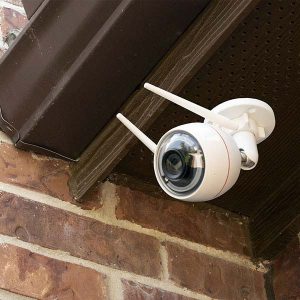 Up High
Up HighWherever you place your cameras outside your house, try to mount them at least 10 feet above ground level. That way, they will be much harder for burglars to tamper with, disable, or cover up.
INSIDE CAMERAS:
In the Foyer
Even if you have outdoor security cameras, having an extra set of eyes in the entrance to your home will let you see who comes in, when, and what they do when they get there.
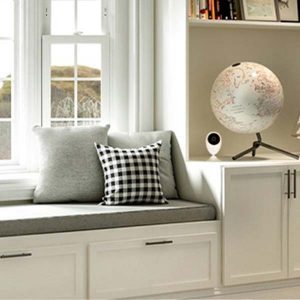 In the Living Room
In the Living RoomThe living room is the heart of the home, and that makes it the perfect place for you to place an indoor camera to watch the comings and goings of your house. Children, spouses, pets, and criminals will all pass through here at some point or another.
In the Garage
If you don’t have a door sensor on your garage entrance, it is especially crucial that you keep an eye on the area. Plus, your garage houses what is likely your most expensive possession: your car.
Facing Medicine and Liquor Cabinets
Prescription drug theft is extremely common in not just burglaries, but also
friend and family theft. In fact, medicine cabinets are overwhelmingly more likely to be raided by someone you know than a stranger. That’s why it’s important to have all drugs, whether over-the-counter or prescription, securely locked away and monitored. The same is true for alcohol.Facing Basement Stairs
Because basement entrances and windows are often not as well maintained or secured as the rest of the house, basements can be the perfect entry point for a would-be criminal.
To learn more about purchasing security cameras for your home, visit this page or talk to an EMC Security Customer Representative at 770-963-0305.
-

Common Home Security Camera Questions
Statistics show that 83% of burglars determine if a home has a security camera before attempting to break-in.
In addition to deterring would-be criminals, security cameras also provide homeowners the convenience of being able to
monitored your home at any time, from anywhere. Want to make sure the kids made it home from school? Check your app to see your kids arriving home safely. Want to keep an eye on your home when you’re away on vacation? Peek at your security footage whenever you feel the need.When deciding on whether or not to opt for security cameras, most customers have questions related to how they actually work and which one will fit their specific needs.
We’ve compiled a few of the most common questions to help you understand all of your home security options.
What types of security cameras are there?
EMC offers three types of security cameras: indoor and outdoor WiFi cameras, doorbell video cameras, and
Flir DVR/NVR camera solutions.Indoor and Outdoor WiFi Security Cameras:
Indoor and outdoor cameras seamlessly integrate with your security system and the latest in smart-home technology through the Alarm.com mobile app.
Video doorbells allow you to see, hear, and speak to anyone at your door whether you’re in your kitchen or across town. Connect your doorbell camera to your security app and control your camera, security, and other automated features such as locks, lights, and thermostat.
If your needs require a more vigorous home surveillance camera system, DVR cameras are among the most dependable cameras on the market, designed for those who want to keep an eye on things with exceptional, high-definition live streaming video and on-site storage.
Are security companies monitoring my security camera footage?
Cameras are self-monitored. EMC Securitydoes nothave access to your cameras or video accounts, so we do not monitor your video camera footage. Video cameras record the footage and send you, the user, a notification and video clip. You can then go to the camera app to view live footage.
Where are the best places to put security cameras?
When deciding the best locations to place your security cameras, it’s important to take a walk around your home with your security goals in mind. Consider the places a potential intruder could enter your home: windows, doors, garage door, or even through the basement.
Also consider placing them out of reach. Some recommended places include:Front Door: An estimated34% of all burglars enter your home through the front door.
Back Door:22% of burglars enter through the back door.
Basement Stairs: Most basements are accessible through small windows that are large enough for a person to enter through.
Off-street Windows:23% of burglars enter through a
first floor window.How is my security footage stored?
Video clips are stored on the Cloud and are accessed via your mobile app. Subscribe to EMC Security’s Video Service for $5 for the first camera and just $1 per additional camera.
Can I monitor my security cameras from my phone?
Yes! Receive alerts and clips of motion detected, and control your alarm system, lights, locks, and thermostats.
Will I be contacted if the security cameras detect anything?
Yes, you can program your system to send instant video clips from home of what matters most to you, from alarm activity to your children coming home from school or a package being delivered.
To learn more about EMC’s security camera options, give us a call today at 770.963.0305.
-
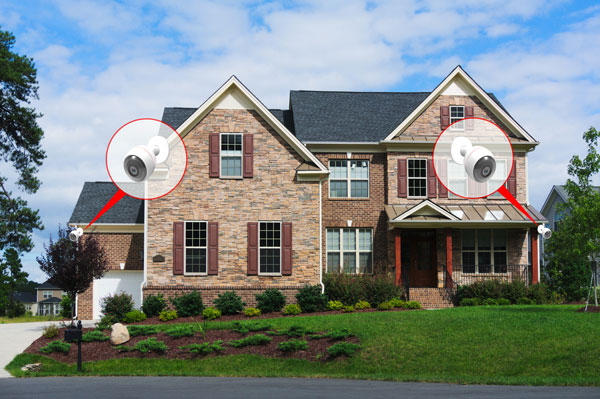
Where to Place Home Security Cameras
Security cameras are the most popular form of home security. There are many to choose from so it’s important to know where to place your cameras for optimal protection (and ease of use).
OUTSIDE CAMERAS:
By the Front Door
Whether you have a doorbell camera at eye-level, or an outdoor camera mounted above the door-frame, having a security camera near your front door allows you to:
- See when the kids get home from school
- Tell if that person at the door is a solicitor, a neighbor, a friend, or someone you just don’t want to talk to
- Keep an eye on your packages to make sure they arrive on time and safe
- And get a headstart on the dogs when you have visitors
By the Back or Side Door
Especially if your back entrance faces the woods, it’s important to keep an eye on what’s going on behind your house. After all, a woody backyard makes the perfect cover for someone trying to break into your home unseen. You can also watch what the kids or pets are up to from a much more comfortable location, like your couch.
On the Gate or Fence-Line
If your property is gated, and especially if your fence-line is out of sight of the house itself, posting a camera on or near the main and side entrances will ensure that you and EMC Security can see your whole yard, including where intruders are likely to enter. And in the case of an emergency like a fallen tree, wildfire, or other unexpected damage, you’ll be able to spot the danger before it causes serious harm.
In First Floor Windows
Windows on the ground floor are one of the most common entrances for burglars, so a visible security camera will go a long way in deterring criminals…and catching them if they do attempt to break in.
 Up High
Up HighWherever you place your cameras outside your house, try to mount them at least 10 feet above ground level. That way, they will be much harder for burglars to tamper with, disable, or cover up.
INSIDE CAMERAS:
In the Foyer
Even if you have outdoor security cameras, having an extra set of eyes in the entrance to your home will let you see who comes in, when, and what they do when they get there.
 In the Living Room
In the Living RoomThe living room is the heart of the home, and that makes it the perfect place for you to place an indoor camera to watch the comings and goings of your house. Children, spouses, pets, and criminals will all pass through here at some point or another.
In the Garage
If you don’t have a door sensor on your garage entrance, it is especially crucial that you keep an eye on the area. Plus, your garage houses what is likely your most expensive possession: your car.
Facing Medicine and Liquor Cabinets
Prescription drug theft is extremely common in not just burglaries, but also
friend and family theft. In fact, medicine cabinets are overwhelmingly more likely to be raided by someone you know than a stranger. That’s why it’s important to have all drugs, whether over-the-counter or prescription, securely locked away and monitored. The same is true for alcohol.Facing Basement Stairs
Because basement entrances and windows are often not as well maintained or secured as the rest of the house, basements can be the perfect entry point for a would-be criminal.
To learn more about purchasing security cameras for your home, visit this page or talk to an EMC Security Customer Representative at 770-963-0305.
-

5 Reasons Why a Video Doorbell is a Great Gift
Thinking about a video doorbell for a loved one?
You’re not alone. This type of video camera is one of the most popular smart-home products of the year. The reason why is because it’s a doorbell, a video camera, and a two-way communications device all wrapped into one.
5 Really Useful Things You Can Do With a Video Doorbell
1. Answer the door from anywhere in the world
- When a visitor rings yourvideo doorbell, it chimes like an ordinary doorbell but you also get an alert on your smartphone app.
- Tap the alert and you’ll see a live video stream of your visitor. They can’t see you but you can see them, and you can have a conversation using the doorbell’s two-way audio feature.
2. Secure a delivered package
- Have you ever experienced the anxiety of having a valuable package being left on your porch when you’re not there? With a video doorbell installed as part of your smart home security system, you won’t need to worry.
- When the delivery driver rings the bell, you can ask them to leave the package inside, unlocking your front door with thesmart lockand disarming your security system all through one app. No smart-locks? You can still instruct the delivery person to place the package in a different location or ask a friend to claim it.
3. Catch a suspicious person in the act
- A video doorbell is actually a complete security camera, able to capture motion-triggered clips, alert you, and store your clips for later viewing.
- It’s a great way to keep an eye on activity around your porch and driveway, which are the busiest areas on your property.
- Should your camera catch something —a suspicious caller or a package thief, you’ll find it easy to download the clip and share it with your local police department.
4. Keep up with the kids
- You can use your video doorbell as a tool for peace of mind. For example, your doorbell camera can send you a daily video alert when your kids arrive home from school.
- Kids also enjoy using video doorbells as a one-way ‘FaceTime’ device, ringing the bell when you’re at work to say hello and give you a wave.
5. Sleep undisturbed
- Naptime is the worst time imaginable for a loud doorbell to chime through your home. Simply put your video doorbell in ‘Do Not Disturb’ mode which switches the chime off, but still sends you a text alert when a visitor rings the bell. Then just open your app, see who’s there, and decide whether to answer or not.
Give EMC Security a call to order your video doorbell at 770-963-0305 today – OR order online right now for just $149.
-

What is “Smart Security”?
Modern, Wireless, Smart Security
When it comes to smart things and security, your experience should be the same. Reliable, flexible and intuitive. A security system app puts you at the center of an ecosystem of smart devices, sensors, video, and advanced automation. Providing you with an unparalleled experience of control, convenience and security.
Smart Integration with Hey Google and Alexa
Safe, simple, and hands-free arming and disarming your system in your house.
Complete Smart Access On the Go
YOU SET THE RULES. Set the rules for real-time notifications. Know instantly when doors and windows are opened or when motion is detected.
REMOTELY ARM/DISARM. Access and manage youralarm system from your mobile phone or tablet.
SIMPLE USER MANAGEMENT. Add new users and change permission levels within seconds. Create temporary accounts for anyone you choose.
MULTIPLE LOCATIONS. Control your home, business or cabin from one, easy-to-use app.
Smart Control at Your Fingertips
SCENES AND AUTOMATION. Program your lights, locks and other devices to turn on or off based on triggers such as you arriving home or the sunrise and sunset.
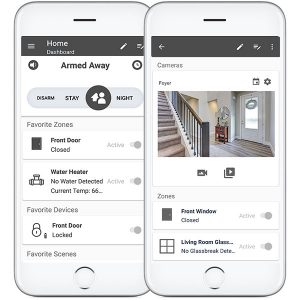
Smart Home Support
LOCKS. Be confident your home is secure with smart lock control at your fingertips.
LIGHTS. Control lights remotely or program them to turn on and off on a schedule or when you arrive home.
THERMOSTATS. Home or away – monitor the temperature of your home with thermostat control.
VIDEO. Keep an eye on the most important people in your life. From kids to packages to four-legged family members—be in-the-know at all times.
-

How to Prevent Stolen Packages
We’ve had many reports of stolen packages from porches lately. This type of crime has been increasing by the day – even more since the pandemic has changed buying habits and more consumer goods are being shipped than ever before.
So, how do you protect your packages so you’re not a victim?
The #1 way to protect against this type of crime is to have an extra set of eyes to watch your back with a video doorbell. The image below is footage from a video doorbell. It’s crisp and clear, time stamped, and sent to your mobile phone instantly.
A Video Doorbell allows you to see and hear exactly who comes to your door, no matter where you are. Even if they don’t ring the doorbell, the PIR (passive infrared) sensor will detect human activity and alert you on your mobile device. With 2-way audio, you can speak with whoever is at the door, watch live video, and store clips.
Another great deterrent is an installed Outdoor Cameras. Studies have shown that burglars are much less likely to target homes with visible security cameras, and the outdoor camera looks the part. It features infrared night vision, so you can see what’s happening at your front door, back entrance, or garage, no matter what. If something is detected, you’ll get notified on your mobile device.
What else can you do?
- First, if possible, become friendly with the people that deliver to your house and let them know where you prefer to have your packages left – like, for instance, behind the potted plant, or by your back door.
- Purchase a package locker or lockbox for your front porch, so your delivery person can lock your holiday gifts safely inside until you get home.
- And don’t forget to post a sign mentioning that your home is under surveillance!
Learn more about EMC Security’s camera options here, and don’t forget to check out the rest of our smart home innovations!




